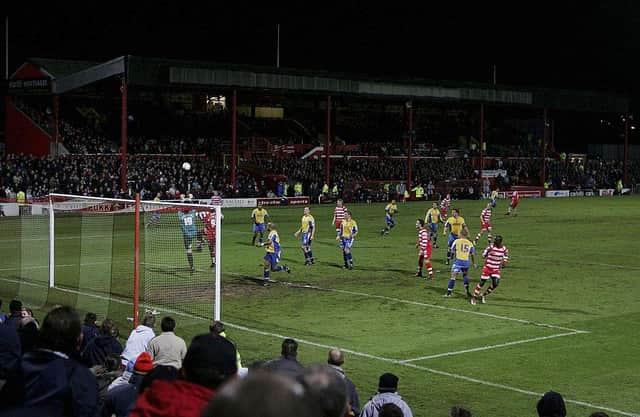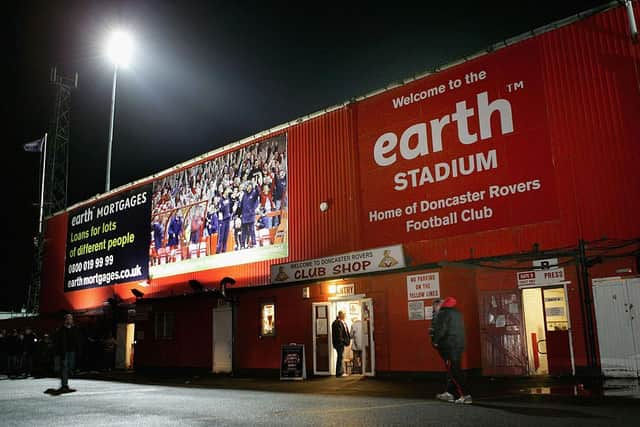Coming to terms with a changing game - Doncaster Rovers fan Andrew Taylor opens up on his problematic relationship with modern day football


“It’s the small boy clambering up stadium steps for the very first time, gripping his father’s hand, gawping at the hallowed stretch of turf beneath him and, without being able to do anything about it, falling in love.”
What does this quote from Bobby Robson mean to you? To me it opens a box of seemingly endless notions.
Advertisement
Hide AdAdvertisement
Hide AdNotions of a game slowly decaying in the ever-greedy world of capitalism. Of resisting the temptation to become lost in thoughts of doom, a sort of ‘enjoy it whilst it lasts’ mantra that I have grown all the more attached to from a fear that one day football will be sanitised of even its current level of authenticity, replaced only by over-priced tickets and plastic pints that fill up from the bottom, somehow.


Notions of an idea that my children should fall in love with the game in ‘proper grounds’ where the same woman has sold the programmes outside the main stand for as long as I can remember and the corrugated iron that provides the shelter on rainy days is as reliable as the striker you’ve just signed from Yeovil.
This trail of thought, this idea that the game that I fell in love with has lost its soul, is something that I have been stuck on for years.
It’s somewhere in my mind at every match I attend.
It may flare up when I see a League One striker with shiny new range headphones (presumably playing Drake’s latest single) ignoring the dozens of kids who have waited outside the stadium for a chance to get his autograph.
Advertisement
Hide AdAdvertisement
Hide AdIt may flare up when I see a father and son paying close to the fee of most Serie A match tickets for two pies and two Bovrils at half time.
It certainly flares up when I see Macclesfield Town facing a winding up order within 12 months of Bury’s extinction.
The result of this is that I reflect on the past as some sort of Utopia. Anything that resembles change I continually resent. From flat pack Ikea stadia based as far from anyone’s house or a local pub as is humanly possible, to the introduction of artificial crowd noise to fool the TV viewer that the decibel levels in at Craven Cottage are now somehow on par with the Azteca in 1986.
The resentment then makes me feel that I must try to cling on to any semblance of purity that I see within the matchday experience and store it in my mental archives.
Advertisement
Hide AdAdvertisement
Hide AdLike a collector of war time memorabilia, I am attempting to find pieces of history that as time goes by are getting harder and harder to find with a looming fear that one day, they’ll be nothing left to find.
In this moment I am effectively sat in a stadium (with thousands of fans around and a football game unfolding all around me) feeling quite lonely.
In this moment I am somewhere else. That somewhere else is the past.
I am not in the present, not feeling the atmosphere, not capable of becoming lost in a great goal and hugging the stranger sat beside me that all season I’ve been wishing would stop berating whichever linesman is nearest our seats.
Advertisement
Hide AdAdvertisement
Hide AdSo why am I even here? And doesn’t something need to change?
These are questions that I have been putting off answering for quite some time for fear of discovering that I have fallen out of love with football.
But just as Joe Wicks had the nation facing up to the fact that we aren’t in as good a fettle as we thought we were just because we did park run once and buy the one calorie spray cooking oil (we all spray it more than once though, don’t we?) there’s nothing like a global pandemic to force you to face up to your fears.
Am I going to watch my beloved Doncaster Rovers in their modern-day stadium, with ticket prices too high for the working class and more loan players within our squad than we are actually permitted to play, for a feeling of community?
Advertisement
Hide AdAdvertisement
Hide AdIf something needs to change, is it modern day football? Is it me and my ability to adapt to change and live in the present? After all, the Utopian past that I am clinging on to is essentially watching a team of nomadic part timers get beaten a record 34 games in one season in 1998 to be relegated to the Conference at our former home Belle Vue.
Who am I to judge that the kid sat eating popcorn, wearing a half and half scarf in the modern day, comfortable family stand is making memories now that are any less precious and formative as mine were?
And isn’t this all irrelevant as the kid looks like he’s completely in the moment and joyous whereas I am sat here in the past feeling sorry for myself. Truth be told, I actually quite like popcorn.
In a world where kids can now watch Messi and Ronaldo at the touch of a button, isn’t it a miracle that League One football is still drawing some of the younger generation in at all, still giving a sense of community and a feeling of belonging to a generation who are accustomed to having immediate access to almost anything they may want, still giving kids whom may face a long term battle to avoid addiction to screens the sensation of real life experience?
Advertisement
Hide AdAdvertisement
Hide AdIf it’s a lack of loyalty that I detest with the modern game, then it is only fair to reflect at whether football did exude loyalty back in the nineties or whether it’s always been this way.
After all, the very first transfer saga that caught my attention as a young lad was Sol Campbell winding his contract down at Spurs to sign for Arsenal on a free transfer in 2001.
Now I look back, even in the nineties there were as many Man Utd shirts as there were Doncaster Rovers at Belle Vue each Saturday, so loyalty was hardly the order of the day back then either.
Is it rational of me to assume that the next player I see ignore a kid who has waited outside for an autograph is a money motivated subhuman being devout of any decent value system?
Advertisement
Hide AdAdvertisement
Hide AdWhat if the next player that I see ignoring a kid happens to be the courageous and clearly morally conscious Marcus Rashford?
Is it not better to assume that this human being, with all the qualities and all the defects of any us, might simply have made a mistake or had a bad morning?
Whether or not the answer is yes or no, I know which of these notions feels better.
Can’t it be okay to not to love everything about the modern game but to at least try to embrace change?
Advertisement
Hide AdAdvertisement
Hide AdMacclesfield and Bury’s plight certainly requires football to take a look at itself and learn a new way forward but might I also learn something new if I do the same and become less cynical about everything that isn’t exactly how it was when I first walked up the steps of Belle Vue?
If I do still love football, like any relationship, doesn’t it require compromise?
When the turnstiles do re-open, I may not agree with everything that I see but I think I owe it to football to try to become more open myself.
Next time I clamber up the stadium steps, I will try to challenge the notions of longing for the past.
As Bobby Robson put it, I will try to feel the passion, the sense of belonging, the pride in my city.